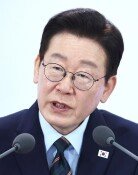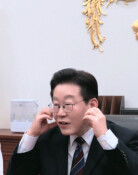Special `Oil-Gate Investigation Ends
Special `Oil-Gate Investigation Ends
Posted November. 16, 2005 08:23,
A special counsel headed by Chung Dae-hoon has completed its three-month official investigation into a controversial Russian oil field development project and released the final results yesterday.
Unable to prove that a person of considerable political might was involved in the project backed by Korea Railroad (Korail), the counsel had to wrap up the inquiry with a reaffirmation of the previous investigation results carried out by public prosecutors.
No evidence of pressure from politicians-
The independent counsel announced it found no critical evidence that Uri Party lawmaker Lee Kwang-jae was involved in the oil-gate scandal. Current circumstances show Lee is likely to have been implicated, but there is not enough evidence to press criminal charges against him, said the counsel. It has decided to maintain the prosecutions decision to drop the inquiry into Lee, in effect reserving its judgment on whether Lee is guilty of the suspicions.
The counsel also explained that no evidence was revealed which would prove governmental groups such as Cheong Wa Dae, the Korean Embassy in Russia, the Ministry of Commerce, Industry and Energy, or the National Intelligence Service had wielded any pressure on the project.
Although the counsel confirmed the fact that Chun Dae-wol, a businessman, raised 150 million won in slush money in a casino at Kangwon Land last April, it could not say where he spent the money.
However, concluding that Woori Bank undertook improper procedures in extending a 6.5 million dollar loan to Korail for the project, the counsel team has decided to request the Financial Supervisory Service to impose disciplinary measures on the bank.
Central figure in scandal, Huh Moon-suk, refuses to return-
As Huh Moon-suk, president of Korea Crude Oil (KCO) was expected to hold the key to the scandal from the very beginning, the case seemed likely to end up a mystery without investigating him.
Apparently, his representative had been negotiating with the independent counsel until the end of October, saying that Huh will come back to Korea if no charges will be filed against him. In order to gather solid findings, the counsel offered him an indictment without physical restraint, but in the end, Huh failed to return.
Controversy over the effectiveness of an independent counsel-
These results had been predicted to some degree since the counsel team was first launched.
As soon as the prosecution announced the results of their investigation, the opposition party demanded an independent counsel, and the ruling party accepted the plan after calculating the political pros and cons.
The counsel team was given voluntary provision of the computers in the Presidential Secretariat and the Ministry of Foreign Affairs and Trade for three months, and was also connected to Cheong Wa Daes internal communications network to look into related officials e-mails. It also confiscated and searched nine offices, including that of Lee Ki-myung, the former leader of President Rohs support group, as well as the e-mails of 48 people involved in the scandal and around 450 financial accounts.
Having spent 1.18 billion won in tax money, the independent counsel has failed to discover any meaningful new facts.
Some media outlets and the opposition party should feel the political and moral responsibility for such results, said Cheong Wa Dae spokesman Kim Man-soo. We expect them to sincerely reflect upon themselves about having relegated the independent counsel into a tool for political means.
On this point, Ha Chang-woo, a public information director of the Korean Bar Association, stated that an independent counsel must be appointed in cases where the prosecution cannot freely conduct an investigation or an investigation by the prosecution is not enough to deliver results. He also said, The ruling and opposition parties must not waste taxpayers money by launching an independent counsel for political interests.
As he finished announcing the results of the inquiry, independent counsel Chung said, A similar counsel on leak-gate in the United States went on for 22 months and is still in the process. He expressed his lingering regrets with the remark: Three months is rather short for investigating what went on with people in top political circles and those around them.
Jin-Kyun Kil leon@donga.com



![[단독]폴란드, 韓 해군 최초 잠수함 ‘장보고함’ 무상 양도 안받기로](https://dimg.donga.com/c/138/175/90/1/wps/NEWS/IMAGE/2026/02/27/133437397.1.jpg)
![‘노인 냄새’ 씻으면 없어질까?…“목욕보다 식단이 더 중요”[노화설계]](https://dimg.donga.com/c/138/175/90/1/wps/NEWS/IMAGE/2026/02/27/133434557.3.jpg)


